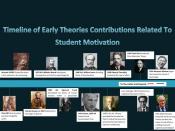External Motivators in the Classroom
Should students be given awards for academic achievement? This is an issue that
has become prevalent in today's schools. What exactly is an academic award anyways?
An academic award refers to an attractive object given as a result of a behavior. Students
begin to receive awards for learning at a very young age. A child's mothers' or fathers'
approval when they say their first words will often result in verbal praise, which is a form
of an award. Awards are a common part of our everyday lives. We receive rewards for
effort in an assortment of ways; a wave returned from a stranger or flowers from a
significant other, but there is large debate concerning whether awards should be given for
learning.
So what are these differing views, and what are their implications? Educational
psychologist A. Kohn, in his work in the Psychological Bulletin describes the behaviorist
approach to awards as a technique for controlling people, "Do this and you will get that."
Kohn believes rewards are ineffective because once the reward stops so too does the
behavior. It is argued that awards are used as a controlling technique; doing things to
children rather than working with them to constructively develop a positive attitude
(Kohn, 1993). By offering students incentives i.e. external awards, for doing tasks that
they already enjoy or are motivated to do, their willingness or motivation to perform that
task may actually decrease (Deci, Koestner, & Ryan, 1999). On the other hand,
educational psychologist P. Chance argues that when teachers reinforce at a high rate,
students' get more enjoyment from their learning. He believes that a performance
contingent reward, delivered unexpectedly, does not harm intrinsic motivation for tasks
(Chance, 1993). Chance actively supports the use of awards to control behavior and
support learning.
There are many different types of awards; tangible awards including task, non-
contingent (awards not requiring working on a task), engagement contingent (awards that
require working on a task), completion contingent (required to finish the task to get
award), performance contingent (awards requiring a determined level of quality) and
verbal awards (positive feedback) (Deci, Koestner and Ryan, 2001). Awards may have
two outcomes. One way awards can be perceived is that they give a feeling that you've
done the right thing, independently using your skills and hard work, and that improves
your intrinsic motivation. The other way some people may see awards is they are given to
gain control over the recipient, and this often results in reducing the recipient's intrinsic
motivation (Deci, Koestner and Ryan, 2001).
Awards can originate from within our consciousness or from external sources;
they might then be described as intrinsic or extrinsic awards. Intrinsic awards are awards
that come from within; pleasure, interest and satisfaction from learning in its own right
and this may lead to intrinsic motivation, a natural tendency to pursue challenges
generated from ones own sense of gratification for the learning process (Harlen &
Deakin-Crick, 2003). Intrinsically motivated learners are interested in, and satisfied by
what they learn. Their learning is self-motivated; they are 'motivated from within', they
are curious about knowledge and recognize their responsibility in their own learning.
They will seek out information and set their own learning goals understanding that what
they achieve depends on their own effort and they are likely to become lifelong learners
(Harlen & Deakin-Crick, 2003). For intrinsically motivated people the reward is in the
learning process itself, and any failure they see to be internal. Some propose that people's
natural needs for a feeling of competence and their self-determination are the base for
intrinsic motivation. Intrinsic motivation is clearly linked to high-quality learning and
adjustment so it is important to encourage intrinsic motivation to learn, as much as
possible.
Chance writes that intrinsically motivated students are less prone to the
detrimental effects of external awards than externally motivated learners may be. Intrinsic
awards are said to be a more reliable alternative to extrinsic awards, but they may be seen
as distant or even unattainable due to lack of ability (Chance, 1992). Although Chance
accepts that extrinsic awards can have a negative affect on motivation for students, he
also states that intrinsic awards are insufficient for effective learning and that "The
teacher must supplement intrinsic awards with extrinsic rewards" including verbal praise
and other forms of recognition for work.
Extrinsic awards come from other people. They can be smiles, verbal praise,
thumbs-up signs, hugs, pats on the back, or applause. Grades, gold stars, certificates,
prizes, and money are examples of tangible extrinsic awards. These are the types of
awards that appear to cause the most controversy from educators and psychologists, as
extrinsic awards could possibly encourage extrinsically motivated learners to engage in
learning only as a means to an end, with little interest or regard for content of knowledge.
Their incentive is found in the awards and they may suffer a decrease or cessation of
learning if awards are stopped (Kohn, 1993).Effort is put into learning the things that are
tested or praised to gain the awards rather than because the learning has value for
developing understanding (Kohn, 1996).
It may be that extrinsic rewards could very well motivate students' who have no
initial interest in a task or who are not academically motivated. Some researchers affirm
that awards won't undermine intrinsic motivation for performing tasks seen as dull or
boring but neither do they have a positive influence on intrinsic motivation for those tasks
because there would not be any intrinsic motivation for dull or boring tasks to begin with.
Therefore it could be debated that there can be no disadvantage in offering extrinsic
awards to dull and boring task, and if it encourages students' to learn what could be the
harm? Chance states that a decline in motivation resulting from awards is very high when
the awards are used as incentives, being offered in advance of task completion and when
they are given out with no regard to performance or when the performance standard is
seen by the recipient as being unachievable. Alternatively awards do not have a negative
effect if students' have a high success rate and in this instance may increase interest in an
activity (Chance, 1993). That is, extrinsic awards can have a positive or negative affect
depending on how they are implemented.
Kohn states that the awards do not lead to any negative effects on motivation and
may actually increase intrinsic motivation, although he does concur that expected
tangible rewards can lead to a decrease in motivation when they are given simply for
participating in an activity. Most people have experienced how volume, tone of voice,
facial expressions and even social atmosphere can affect the way we interpret the
meaning of comments directed to us, and these variables may result in verbal awards
being interpreted or misinterpreted, as manipulative resulting in a decrease in intrinsic
motivation. It is important that verbal, or any award, is delivered in such a way so as not
to be condescending or controlling but rather to be informational. Deci expresses the
opinion that awards which are delivered in a context that conveys competence will
benefit intrinsic motivation. For example, to say to a student, "Well done, that's exactly
what I hoped you would do" gives an impression of control which may lead to a decrease
in intrinsic motivation. The informational or positive way of delivering a verbal reward
might be "Well done. It's great to see how hard you tried and how well you studied and
understand the material" giving the student a boost of confidence which may result in an
increase in intrinsic motivation.
Verbal awards are arguably the most effective in encouraging students' feelings
of self efficacy (Cameron & Pierce, 1994) although they seem to have less impact on
younger children than adults. Verbal awards don't always increase intrinsic motivation,
as they too can sometimes be seen as controlling, not only because some people
voluntarily behave or do specific things to get verbal awards, but also some teachers'
may use them with the intention of inducing a behavior or activity (Cameron & Pierce,
1994). To be effective in encouraging an intrinsic attitude to learning, it is suggested that
verbal awards must be sincere, be aimed at attributes or performances that students' can
control, not refer or rely on peer comparison, and reflect realistic standards and
expectations. As with all awards, they should be delivered immediately after the target
behavior occurred for them to be effective.
Deci, Koestner and Ryan, (2001) suggest that rather than attempting to encourage
people to find tasks interesting by offering them awards for learning, it would be better to
develop their understanding of how the activity is important to them in their real lives to
instill intrinsic motivation. They suggest that behavioral based lessons are so "crushingly
boring" that it is necessary to provide extrinsic awards to keep students' motivated and
suggest that constructivist educators should aim to make tasks themselves intrinsically
interesting thus render unnecessary the need for external motivators or awards. Rewards
can't magically motivate people to find tasks interesting if in their hearts they perceive on
tasks they find them dull and boring (Deci, Koestner and Ryan, (2001).
Research shows that tangible awards do significantly undermine intrinsic
motivation whereas verbal awards given unexpectedly, with genuine reason and with
interpersonal skill, will increase intrinsic motivation if the classroom atmosphere is
supportive rather than controlling. The affect of awards is probably best summed up by
Harackiewicz, Manderlink and Sanaone (1984) when referring to cognitive evaluation
theory;" If performance is instrumental to reward attainment, individuals may perceive
their behavior as extrinsically determined, and subsequent intrinsic motivation can be
undermined (controlling process). If perceptions of competence are developed, however,
intrinsic motivation may be enhanced (informational process) (p.287).
The use of awards for learning may lead to encouraging shallow learning,
learning for the sake of achieving awards which might be acceptable in limited conditions
such as boring tasks. It is intrinsic awards however that lead to intrinsic motivation for
learning; this in turn leads to deep learning and self satisfaction in the learning process.
This is a much more difficult goal for a teacher to achieve but perhaps a more honorable
one. To achieve this, students' need to see the value of their learning for themselves and
this might be best accomplished through interesting, constructivist planned lessons using
authentic tasks. There are a wide variety of meanings put to the term award, and each
will have different motivational implications. Many teachers' have successfully used
external award programs for learning frequently. The act of awarding students' should be
a personal judgment based not only on the tasks performed and the type of award, but
also on the personality of the award recipient, the deliverer, as well as the environment
the award is given in. For an award to be intrinsically motivating it must be genuine,
unexpected and to be of real value to the recipient. It may be a matter of the right award,
in the right circumstances, to the right person.
Works Cited
Chance, P. (1993). Sticking up for rewards. Phi Delta Kappan, 74(10):787-790.
Deci, E. L., Koestner, R., & Ryan, R. M. (1999). A meta-analytic reviewof experiments examining the effects of extrinsic rewards on intrinsicmotivation. Psychological Bulletin, 125, 627-668.
Deci, E,. Koestner, R. & Ryan,R. (2001). Extrinsic Rewards and Intrinsic Motivation in Education: Reconsidered Once Again. Review of Educational Research, Spring 2001, Vol. 71, No. 1, pp.1-27
Eisenberger, R., Pierce, W. D., & Cameron, J. (1999). Effects of reward on intrinsic motivation: Negative, neutral, and positive. Psychological Bulliten, 125, p. 677-691.
Harackiewicz, J,. Manderlink, G,. and Sansone, C.(1984). Rewarding Pinball Wizardry: Effects of Evaluation and Cue Value on Intrinsic Interest. Journal of Personality and Social Psychology Volume 47, Issue 2, 1984.
Harlen, W and Deakin-Crick, R,. (2003). Testing andMotivation for Learning, Assessment in Education: Principles, Policy & Practice,10:2, 169 - 207
Kohn, A. (1993). Punished by rewards: The trouble with gold stars, incentive plans, AÃÂs, praise and other bribes. Boston: Houghton Mifflin Company.
\:


